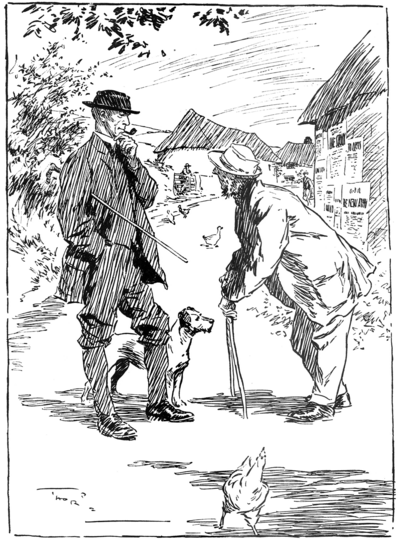
"No, Sir, they wouldn't take our Fred, 'cos they said he'd a-got bellicose veins."
(Note: If this essay in the well-informed manner achieves any success, the credit is largely due to the timely interruptions of the Censor.)
Few people, I think, realise the tremendous significance of waterproof overalls in a war like the present. I was talking to one of our most prominent Midland manufacturers at Sheringham the other day and he remarked confidentially [passage deleted by the Censor] at fifteen per cent. reduction to our soldiers for spot cash.
Which reminds me of a stifling Malta afternoon, when I first saw the good ship Sheringham steam slowly up through the haze of Sliema Creek. It was in the early days of the Navy's grey-paint era. The change was a drastic one, as all service-men admitted. And why grey? I make no secret of the fact that I have always advocated ultramarine for the Mediterranean station; but the Grey Water School, you know—well, there, I must not be indisercet.
Life on a cruiser may be the tally for some, but give me the nimble t.b.d.! There you have none of "the great monotony of sea" which drove W.M.T. to his five meals a day. Nothing but the charming fraternité of the wardroom, the delightful inconsequences of the chart-house kitten, and the throb of the oil-fed turbine! Unless I am greatly mistaken [passage deleted by the Censor which shows that I wasn't].
I was dining the other evening at the Buckingham Palace with a friend who is well known in Foreign Office circles. The conversation turned, naturally enough, on the dangers in our midst from foreign waiters. The English waiter who was attending us happened at the moment to dislodge with his elbow a wine-list which, in falling, decanted a quantity of Sauterne into the lap of my vis-à-vis, who remarked [passage deleted by the Censor].
I learn from reliable sources that one wing of our "contemptible little army' is resting upon ———. Dear old ———! How often have I wandered down your sleepy little High Street to the épicerie of our lively old Thérèse! But that was in the old days, before the black arts of Kaiserism transformed the peace of yesterday into the Armageddon of to-day. Next week I shall deal more intimately with life behind the scenes in German frontier towns; but you must wait with what patience you can for these further confidences.
With footsteps too cunning to swerve,
They swing through the heights of the jungle,
These stalwarts of infinite nerve;
Blithe sailors who heed not the breezes
Which play round their riggings and spars,
Lithe gymnasts who live on trapezes
And parallel bars.
They scamper, they slither and slide
In the throes of a tropical tango,
In the grip of a Gibbony glide;
'Tis thus in these desolate spaces,
Away from humanity's ken,
They mimic the civilised races
And strive to be men.
O'er creepers of myriad shapes,
They mouth not the meaningless chatter
Of dull and demoralised apes;
But, proud of their portion as creatures
Who know not the stigma of tails,
They screw up their weather-worn features
And practise their scales.
When I study some antic that hints
At the physical fitness of Sweden,
The speed of American sprints,
I dream of the wreaths and the ribbons
Their prowess would certainly win,
If there weren't any war, and my gibbons
Could go to Berlin.
J. M. S.
